Can you legally ask for proof of a service dog? What are the service dog legal requirements? Understanding the ADA service dog laws and documentation is essential for businesses, airlines, hotels, landlords, and the general public. In this article, I will break down the legal aspects of requesting proof for a service dog and provide clarity on the guidelines set forth by the Americans with Disabilities Act.
Key Takeaways:
- Businesses can only ask two questions to determine if a dog is a service animal.
- Service dogs are not required to wear vests or carry documentation.
- Airlines are not allowed to ask for proof of a service dog’s status.
- Hotels are prohibited from asking for proof of a service dog.
- Landlords must provide reasonable accommodations for tenants with service dogs.
What Can You Ask About a Service Dog?
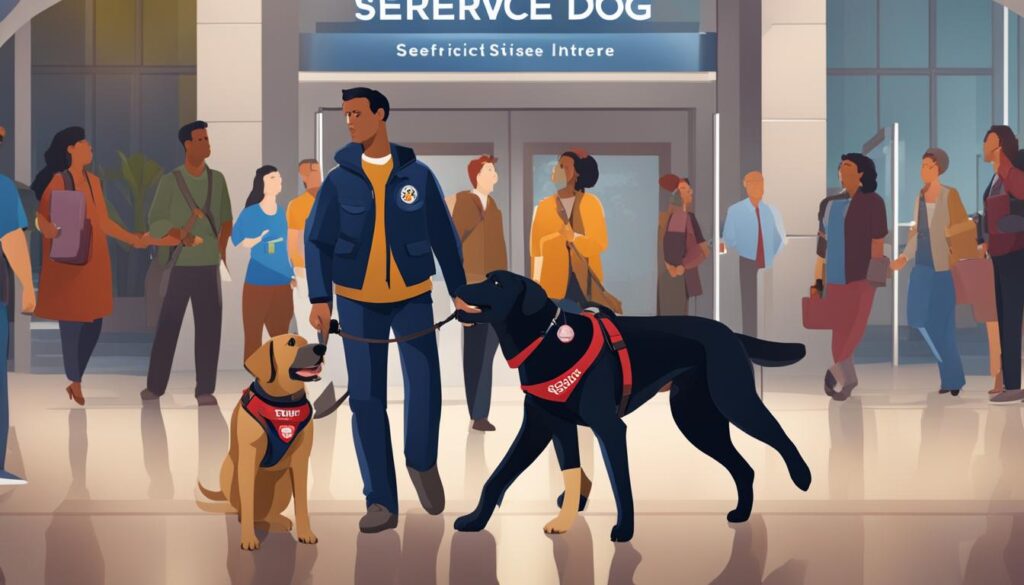
When it comes to service dogs, knowing what you can ask and what you can’t ask is crucial to ensure that individuals with disabilities and their service dogs are treated with respect and given their rights. Under the Americans with Disabilities Act (ADA), there are specific guidelines that businesses and their staff must follow when an individual and their service dog enter a public place or establishment.
According to the ADA, staff members are only allowed to ask two questions:
- “Is the dog a service animal required because of a disability?”
- “What work or task has the dog been trained to perform?”
These questions help determine if the dog is indeed a service animal and if it is performing tasks that assist its handler with their disability. However, staff members are not allowed to ask about the specific details of the individual’s disability or request any medical documentation.
It’s important to note that service dogs are not required to wear vests or carry any specific documentation. Their training and the tasks they perform are what define them as service animals, not their appearance or documentation. This ensures that individuals with invisible disabilities are not questioned based on their lack of visible indicators.
“Is the dog a service animal required because of a disability?”
“What work or task has the dog been trained to perform?”
These two questions help businesses understand if the dog’s presence falls under the protected category of service animals, granting them access rights as defined by the ADA. By focusing on these questions, businesses can uphold the rights of individuals with disabilities while maintaining a respectful and inclusive environment.
Service dog access rights are essential to ensure equal opportunities for individuals with disabilities, and understanding the limitations on questioning is a crucial part of respecting those rights.
Key Takeaways:
- Business staff are only allowed to ask two questions related to service dogs: if the dog is a service animal required because of a disability, and what work or task the dog has been trained to perform.
- Staff members cannot ask about an individual’s specific disability or request medical documentation.
- Service dogs are not required to wear vests or carry documentation.
- By focusing on these two questions, businesses can uphold the rights of individuals with disabilities and create an inclusive environment.
Can Airlines Ask for Proof of Service Dog?
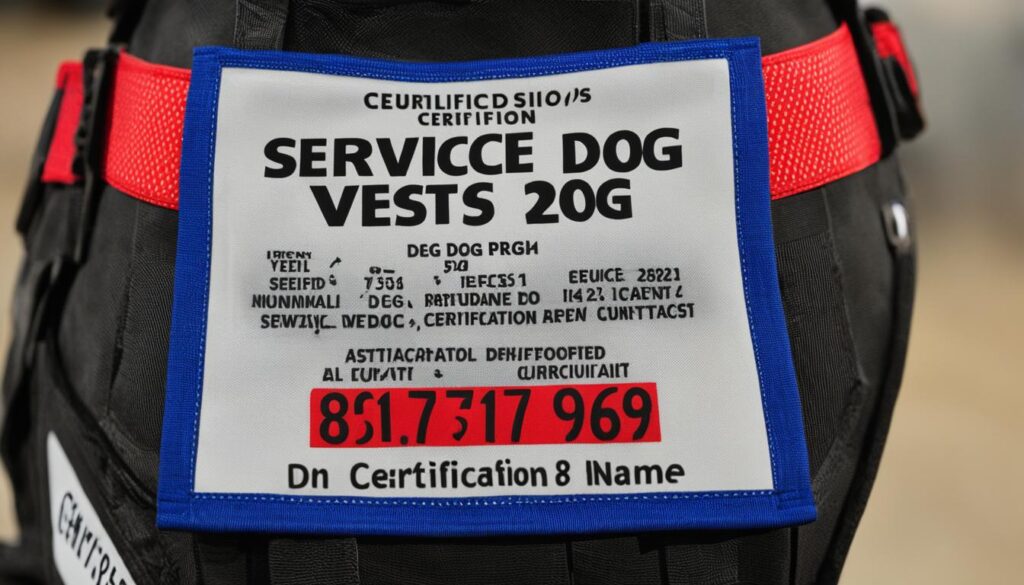
Service dogs provide indispensable assistance and support to individuals with disabilities. When it comes to air travel, it’s important to understand the regulations surrounding service dogs and their identification. Under the Air Carrier Access Act (ACAA), airlines are not allowed to ask for proof of a service dog’s status. The ACAA mandates that airlines recognize and accommodate service dogs on flights, ensuring equal access for individuals with disabilities.
The Department of Transportation (DOT) enforces the ACAA and has set specific guidelines for airlines regarding service dogs. These guidelines prioritize the rights of individuals with disabilities and their service dogs while also maintaining safety and order in the cabin and airport.
While airlines cannot ask for formal proof or certification of a service dog, they can deny transport to a service dog if they pose a safety threat or would cause a significant disruption on the plane or at the airport. It is paramount for service dog handlers to ensure their dogs are trained appropriately and behave according to the airline’s policies and guidelines.
Although airlines cannot ask for proof of service dog identification, it is recommended for service dog handlers to carry relevant documentation that verifies their dog’s status and training. This documentation can include a letter from a healthcare professional, a registration certificate from a recognized service dog organization, or any other form of identification that helps establish the legitimacy of the service dog. While not required, these documents can help address any concerns or questions that may arise during the boarding process.
By adhering to the regulations set forth by the ACAA, airlines ensure that individuals with disabilities have the same opportunities to travel as any other passenger. Service dogs play a crucial role in the lives of their handlers and are essential for their well-being and independence. Therefore, it is crucial for airlines to respect and accommodate service dogs while maintaining the overall safety and comfort of all passengers.
| Airline Requirements for Service Dogs | Allowed | Not Allowed |
|---|---|---|
| Recognizing service dogs as assistance animals | ✓ | x |
| Requesting proof or certification of service dog status | x | ✓ |
| Denying transport if the service dog poses a safety threat or causes significant disruption | x | ✓ |
| Requiring appropriate behavior and adherence to airline policies | ✓ | x |
While airlines cannot ask for service dog identification, they have the responsibility to ensure the smooth operation of their flights and maintain a safe and comfortable environment for all passengers. Understanding the rights and responsibilities surrounding service dogs and air travel is crucial for both service dog handlers and airlines, ensuring a positive travel experience for everyone involved.
Can a Hotel Ask for Proof of Service Dog?
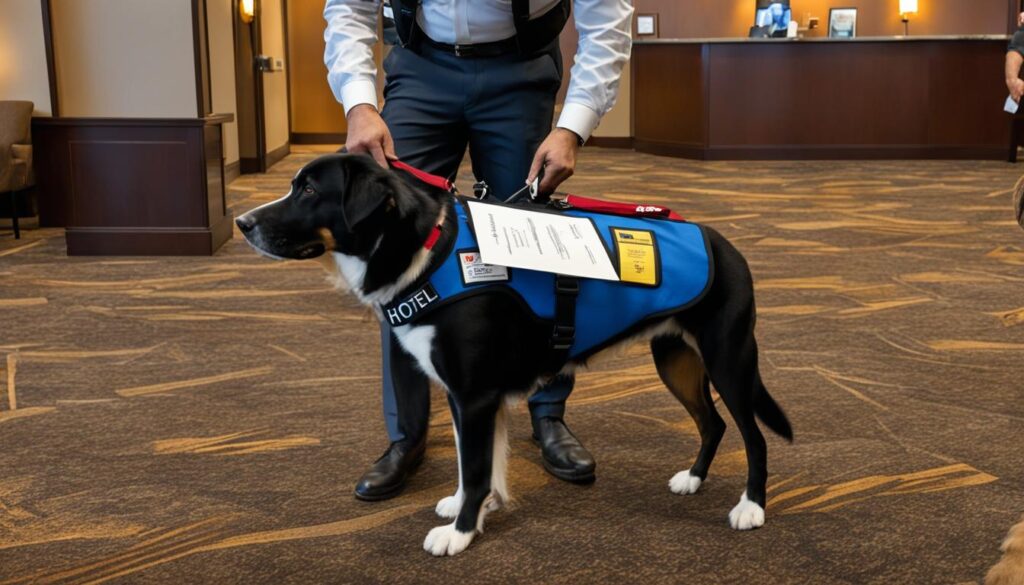
The ADA prohibits hotels from asking for proof of a service dog. A service dog is not considered a pet and can accompany its owner or handler in hotel rooms and public areas. However, the handler and their dog must follow the hotel’s rules, such as keeping the dog under control and not causing any damage.
Hotels, like other businesses, must comply with the Americans with Disabilities Act (ADA) when it comes to service dogs. According to the ADA, service dogs are not required to wear vests or carry any form of identification. The law is designed to protect the rights of individuals with disabilities and ensure equal access to public accommodations.
While hotels cannot ask for proof of a service dog, they can ask an individual whether the dog is a service animal required because of a disability and what tasks the dog has been trained to perform. These questions help determine if the dog meets the definition of a service animal under the ADA.
“Is the dog a service animal required because of a disability?”
“What work or task has the dog been trained to perform?”
Hotel staff should not ask for details about the individual’s disability, request documentation, or inquire about the dog’s training methods. It is essential to respect the privacy and dignity of individuals with disabilities while ensuring compliance with the ADA.
It is worth noting that hotels can set reasonable rules for service dogs. While a service dog has access to hotel rooms and public areas, they must also adhere to any applicable pet policies, such as being leashed, under control, and not causing any damage. These rules are in place to ensure a comfortable and safe environment for all guests.
Service Dog Access Rights in Hotels
Service dogs have the right to accompany their handlers in hotels and enjoy the same access as any other guest. They are not limited to specific areas or subjected to additional fees or restrictions due to their service dog status.
Hotels must make reasonable accommodations for individuals with disabilities and their service dogs. This includes allowing them to stay in a room that meets their needs and providing accessible paths of travel throughout the hotel premises.
It is important for hotel staff to be knowledgeable about service dog access rights and to treat individuals with disabilities and their service dogs with respect and understanding.
| Service Dog Access Rights in Hotels | Service Dog Identification in Hotels |
|---|---|
| Service dogs have the right to accompany their handlers in hotels and enjoy the same access as any other guest. | Hotels are not allowed to ask for proof of a service dog’s status. |
| Hotels must make reasonable accommodations for individuals with disabilities and their service dogs. | Service dogs are not required to wear vests or carry any form of identification. |
| Service dogs must follow the hotel’s rules, such as being leashed and under control. | Hotel staff can only ask two questions to determine if a dog is a service animal: |
| Hotel staff should be knowledgeable about service dog access rights and treat individuals with disabilities and their service dogs with respect. | “Is the dog a service animal required because of a disability?” |
| “What work or task has the dog been trained to perform?” |
Can a Landlord Ask for Proof of Service Dog?
As a service dog handler, it’s crucial to understand your rights when it comes to housing accommodations. The Americans with Disabilities Act (ADA) protects individuals with disabilities from housing discrimination, including the right to have a service dog in their home.
Under the ADA, landlords are generally not allowed to ask tenants about the nature or extent of their disability. This means that they cannot demand proof of a service dog’s status or ask for specific medical documentation. However, it is important to note that individuals must still request reasonable accommodations from their landlords.
While landlords cannot ask for proof of a service dog, they may require tenants to provide documentation about their need for a service dog. This documentation typically comes in the form of a letter from a healthcare professional or a service dog certification. It is recommended that individuals keep this documentation on hand in case any questions or concerns arise from the landlord.
It’s important to remember that while a landlord cannot discriminate against tenants with disabilities who have service dogs, they can still enforce rules and regulations to maintain a safe and comfortable living environment. This includes rules related to noise, cleanliness, and other tenant responsibilities.
Overall, the ADA protects the rights of service dog handlers and ensures that they can live with their service dogs without facing discrimination. By understanding your rights and responsibilities, you can navigate the housing process confidently and enjoy the benefits of having a service dog in your home.
Service Dogs in “No Pets Allowed” Businesses
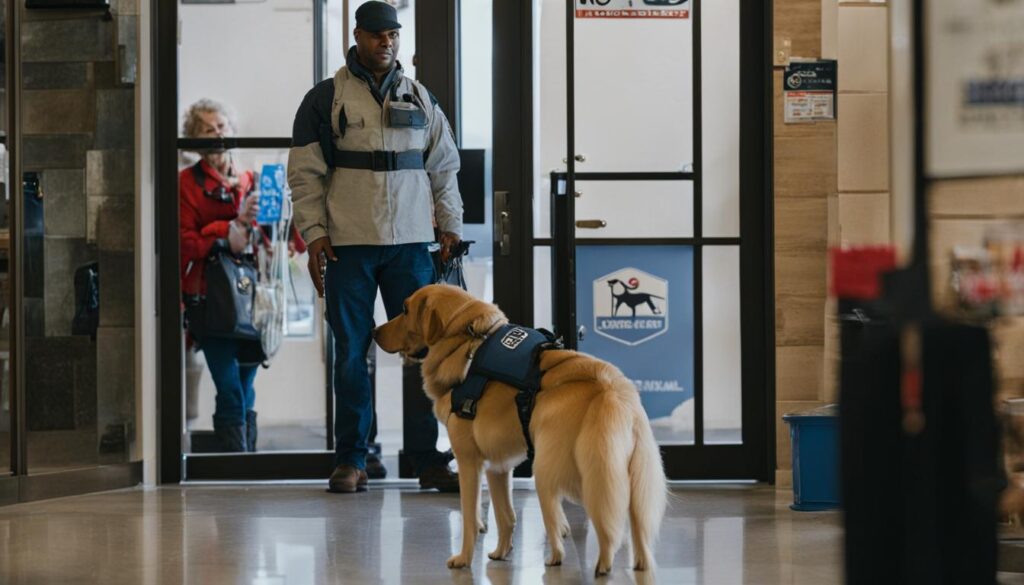
Service dogs play a crucial role in assisting individuals with disabilities, providing them with the necessary support to navigate their daily lives. However, many businesses have policies that do not allow pets on their premises. It’s important to understand that service dogs are not considered pets, but rather working animals that provide vital assistance to their handlers.
Under the Americans with Disabilities Act (ADA), businesses that typically do not allow pets must still permit service dogs to accompany their handlers in all areas that are open to the public. This means that service dogs should be given the same access rights as any other customer, without any additional requirements or documentation.
Business owners and their staff are only permitted to ask two specific questions in order to determine if a dog is a service animal:
- “Is the dog a service animal required because of a disability?”
- “What work or task has the dog been trained to perform?”
These questions help to establish whether the dog is indeed a service animal and whether it is individually trained to perform tasks that directly assist with the handler’s disability. However, it is important to note that business owners and staff are not allowed to inquire about the handler’s specific disability or request any form of medical documentation.
In summary, service dogs have the right to access businesses that have a “no pets allowed” policy. Business owners and staff must accommodate these service dogs and their handlers, providing them with equal access to all public areas. By understanding and respecting these rights, businesses can create a welcoming environment for individuals with disabilities and ensure compliance with the ADA.
Do Service Dogs Need to Wear a Vest?
Legally, service dogs are not required to wear a special vest. However, outfitting a service dog with a vest can help identify them as a working dog and prevent unwanted interactions. It can also provide reassurance to business owners, staff, and others that the dog is trained to assist its handler.
While not mandatory, many service dog handlers choose to use vests or other forms of identification for their dogs. This can help avoid unnecessary scrutiny and questions about the dog’s purpose in public places, ensuring a smoother experience for both the handler and the dog.
Why Consider Using a Vest for a Service Dog?
There are several reasons why service dog handlers may opt to have their dogs wear vests:
- Identification: A vest helps visually identify the dog as a service animal, allowing others to distinguish them from pets or emotional support animals.
- Access Rights: A vest can signal to business owners and staff that the dog is working and should be granted the same access rights as outlined by the ADA.
- Stress Reduction: Wearing a vest can reduce stress and anxiety for the handler since it may deter strangers from approaching or interfering with the dog’s work.
- Visibility: A vest can make the service dog more visible in crowded or busy environments, making it easier for others to notice and accommodate their needs.
It’s important to note that while a vest can be helpful, it does not replace the legal rights and protections afforded to service dogs by the ADA. Regardless of whether a service dog is wearing a vest, businesses and establishments must still abide by the ADA guidelines and grant access to service dog handlers.
Types of Service Dogs
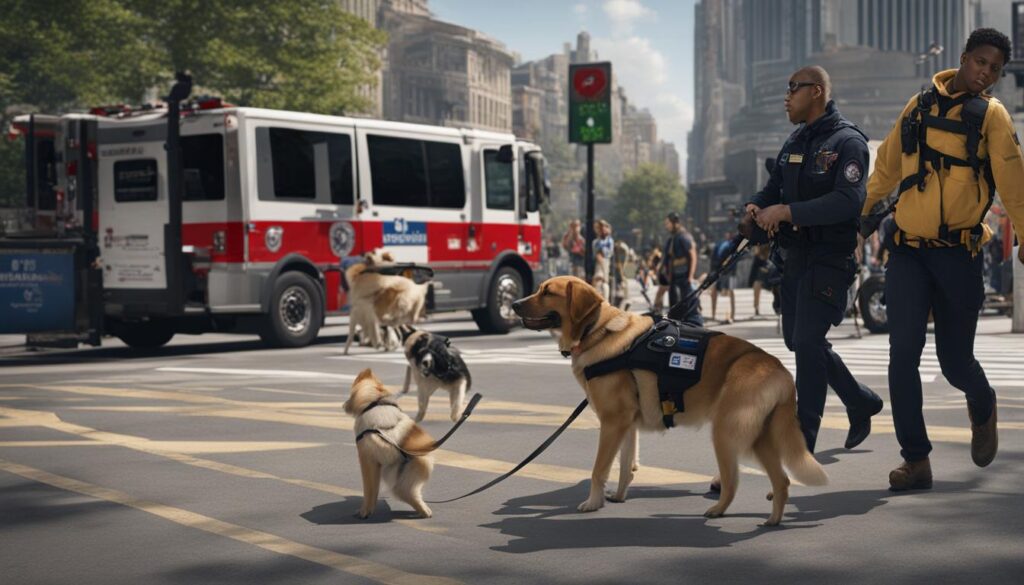
Service dogs play a crucial role in assisting individuals with disabilities and enhancing their quality of life. These highly trained canines can provide support both physically and emotionally, depending on the specific needs of their handlers.
Service dogs can be categorized into two main types: Psychiatric Service Dogs (PSDs) and dogs for physical disabilities. Each type serves a unique purpose and undergoes specialized training to perform their designated tasks.
Psychiatric Service Dogs (PSDs)
Psychiatric Service Dogs are trained to assist individuals with mental health disorders, such as anxiety, post-traumatic stress disorder (PTSD), depression, or bipolar disorder. These dogs provide emotional support and perform specific tasks to mitigate the effects of their handler’s condition.
PSDs can offer various forms of assistance, including:
- Providing deep pressure therapy to help alleviate anxiety or panic attacks
- Interrupting intrusive thoughts or repetitive behaviors
- Alerting their handler to signs of distress or impending anxiety episodes
- Creating a physical barrier to provide personal space in crowded areas
Physical Disability Service Dogs
Physical disability service dogs are trained to assist individuals with mobility challenges, visual impairments, or medical conditions such as diabetes or seizures. These dogs perform specific tasks to enhance their handler’s independence and safety.
Some specialties of physical disability service dogs include:
- Guide Dogs: Trained to assist individuals with visual impairments, guide dogs help navigate obstacles, avoid hazards, and provide a sense of security while moving independently.
- Diabetic Alert Dogs: These dogs are trained to detect changes in their handler’s blood sugar levels and alert them to dangerously high or low levels, enabling timely intervention.
- Seizure Response Dogs: Trained to recognize the signs of an impending seizure, seizure response dogs can provide support during an episode by offering comfort, alerting others for assistance, or retrieving medication.
Service dogs offer invaluable support to individuals with disabilities, improving their daily lives and promoting greater independence. Whether it’s a Psychiatric Service Dog providing emotional stability or a Guide Dog assisting with navigation, these incredible canines make a significant difference in the lives of their handlers.
Training a Psychiatric Service Dog
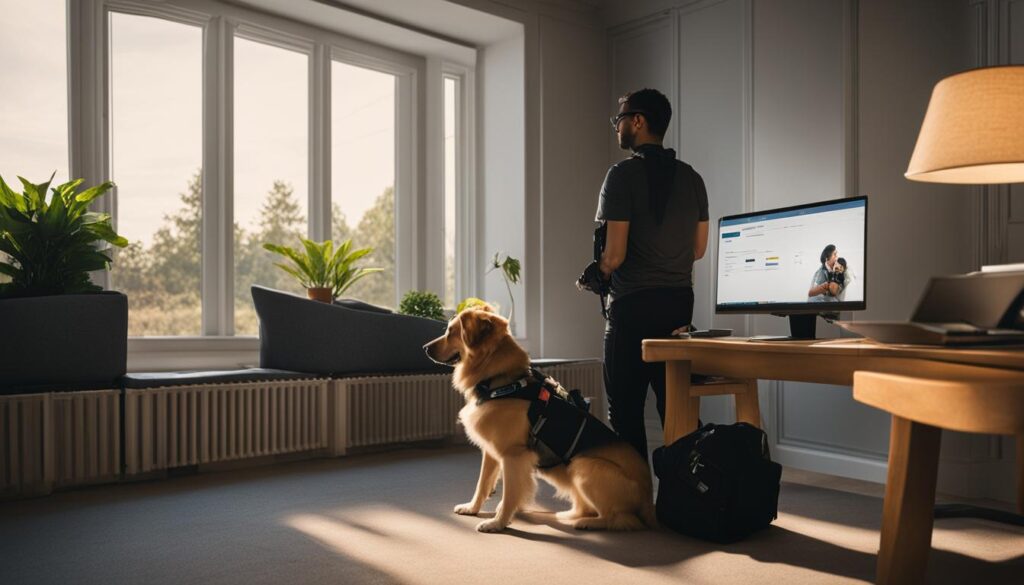
Individuals who want to convert their pet into a psychiatric service dog have two options: online psychiatric service dog training or in-person training programs. Online training programs, like the one offered by Pettable, provide a convenient and cost-effective way to train your own dog for duties related to your mental health. In-person training programs are also available but tend to be more expensive and less convenient.
When choosing between online training and in-person training, it is essential to consider your preferences and the needs of your psychiatric service dog. Online training programs offer the flexibility of learning at your own pace from the comfort of your home. They typically include video tutorials, instructional materials, and access to professional trainers who can provide guidance and support remotely.
In-person training programs, on the other hand, provide a more hands-on approach with direct interaction between you, your dog, and the trainers. These programs often involve structured classes, group activities, and real-life simulations to simulate common psychiatric service dog tasks. While they offer personalized attention and immediate feedback, they may require more time and financial commitment.
Benefits of Online Psychiatric Service Dog Training
Online psychiatric service dog training programs offer several advantages:
- Convenience: Learn at your own pace and schedule, fitting the training around your daily routine.
- Cost-effectiveness: Online programs are often more affordable than in-person training, making it accessible to a wider range of individuals.
- Flexible learning: Access video tutorials, instructional materials, and professional trainers remotely, enabling you to learn at your convenience.
- Comfortable environment: Train your dog in the familiar surroundings of your home, which can reduce stress for both you and your pet.
Considerations for In-Person PSD Training
If you prefer in-person training, keep in mind the following:
- Personalized attention: Receive direct guidance from trainers who can observe and address individual challenges and progress.
- Real-life simulations: Participate in activities and exercises that simulate real-world scenarios, preparing you and your dog for various environments.
- Immediate feedback: Get instant feedback from trainers, allowing for quicker adjustments and improvement in training techniques.
- Socialization opportunities: Engage with other dog owners, sharing experiences and building a supportive community.
Ultimately, the choice between online and in-person psychiatric service dog training depends on your specific needs, preferences, and circumstances. Consider factors such as your availability, budget, and the level of guidance and support you require. Whichever method you choose, the goal is to ensure that you and your dog receive proper training and develop a strong bond that enhances your mental well-being and independence.
Service Dogs vs. Emotional Support Animals
In the realm of assistance animals, there are two distinct categories: service dogs and emotional support animals (ESAs). While both play essential roles in providing support to individuals, they differ significantly in terms of legal protection and the services they offer.
A service dog is trained to perform specific tasks that mitigate the effects of a person’s disability. These tasks can include guiding individuals with visual impairments, alerting people with hearing loss to sounds, and even detecting oncoming seizures. Service dogs receive extensive training to ensure they can carry out these tasks effectively and reliably.
On the other hand, emotional support animals, as the name suggests, provide emotional comfort and companionship to their owners. These animals typically do not undergo the same rigorous training as service dogs and do not perform specific tasks directly related to a person’s disability. Instead, their mere presence and affectionate nature offer emotional support to individuals facing various mental health challenges.
It is essential to note that while service dogs are protected under the Americans with Disabilities Act (ADA), emotional support animals do not enjoy the same legal protections. The ADA mandates that service dogs be permitted access to public spaces, transportation, and other accommodations to assist their handlers. This protection ensures individuals with disabilities can rely on their service dogs for uninterrupted support and assistance.
However, emotional support animals are not covered by the ADA. As a result, businesses and establishments may not be required to grant them the same access rights as service dogs. While some accommodations may allow emotional support animals, it is solely at their discretion and not a legal requirement.
Understanding the distinction between service dogs and emotional support animals is crucial when it comes to legal rights and access. While both provide vital forms of support, service dogs’ extensive training and specific task performance afford them ADA protection and greater access to public spaces.
Wrapping Up
Understanding the legal requirements and rights surrounding service dogs is essential for businesses, airlines, hotels, landlords, and the general public. The Americans with Disabilities Act (ADA) provides specific guidelines on what can and cannot be asked about a service dog, as well as where they are allowed to go. It is crucial to respect the rights of individuals with disabilities and their service dogs while also ensuring compliance with the law.
According to ADA service dog laws, businesses can only ask two questions to determine if a dog is a service animal: “Is the dog a service animal required because of a disability?” and “What work or task has the dog been trained to perform?” Staff are not allowed to inquire about the individual’s specific disability or request medical documentation. These legal requirements aim to protect the privacy and dignity of individuals with disabilities.
Service dog access rights extend to various settings, including public places, hotels, and airlines. While airlines are not allowed to ask for proof of a service dog’s status under the Air Carrier Access Act, hotels and landlords are also prohibited from asking for such proof. However, individuals may be required to request reasonable accommodations and provide documentation about their need for a service dog in some cases.
By understanding and adhering to the legal requirements and rights surrounding service dogs, we can foster inclusivity and ensure equal access for individuals with disabilities and their invaluable service companions.
FAQ
Can you legally ask for proof of a service dog?
No, according to the ADA, businesses can only ask two questions to determine if a dog is a service animal.
What can you ask about a service dog?
You can ask: (1) “Is the dog a service animal required because of a disability?” and (2) “What work or task has the dog been trained to perform?”
Can airlines ask for proof of a service dog?
No, under the Air Carrier Access Act, airlines are not allowed to ask for proof of a service dog’s status.
Can a hotel ask for proof of a service dog?
No, hotels are prohibited from asking for proof of a service dog.
Can a landlord ask for proof of a service dog?
While landlords cannot ask about the nature or extent of a disability, individuals may be required to provide documentation when requesting reasonable accommodations for a service dog.
Can service dogs enter "no pets allowed" businesses?
Yes, businesses that do not typically allow pets must allow service dogs to accompany their handlers without requiring proof or documentation.
Do service dogs need to wear a vest?
Legally, service dogs are not required to wear a special vest, but it can help identify them as working dogs.
What are the types of service dogs?
There are various types of service dogs, including Psychiatric Service Dogs (PSDs) and dogs for physical disabilities like diabetic alert dogs and guide dogs.
How can I train a psychiatric service dog?
You have two options: online psychiatric service dog training or in-person training programs. Online training programs, like the one offered by Pettable, provide a convenient and cost-effective option.
What’s the difference between service dogs and emotional support animals (ESAs)?
Service dogs are trained to perform specific tasks for individuals with disabilities, while ESAs provide comfort and companionship but are not protected under the ADA.
What are the legal requirements and rights surrounding service dogs?
The ADA provides specific guidelines on what can and cannot be asked about a service dog, as well as where they are allowed to go. It is crucial to respect the rights of individuals with disabilities and their service dogs while ensuring compliance with the law.






